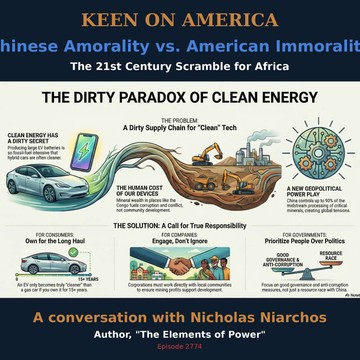

Keen On America
Andrew Keen
Nobody asks sharper or more impertinent questions than Andrew Keen. In KEEN ON, Andrew cross-examines the world’s smartest people on politics, economics, history, the environment, and tech. If you want to make sense of our complex world, check out the daily questions and the answers on KEEN ON.
Named as one of the "100 most connected men" by GQ magazine, Andrew Keen is amongst the world's best-known technology and politics broadcasters and commentators. In addition to presenting KEEN ON, he is the host of the long-running show How To Fix Democracy and the author of four critically acclaimed books about the future, including the international bestselling CULT OF THE AMATEUR.
Keen On is free to listen to and will remain so. If you want to stay up-to-date on new episodes and support the show, please subscribe to Andrew Keen’s Substack. Paid subscribers will soon be able to access exclusive content from our new series Keen On America – keenon.substack.com
Named as one of the "100 most connected men" by GQ magazine, Andrew Keen is amongst the world's best-known technology and politics broadcasters and commentators. In addition to presenting KEEN ON, he is the host of the long-running show How To Fix Democracy and the author of four critically acclaimed books about the future, including the international bestselling CULT OF THE AMATEUR.
Keen On is free to listen to and will remain so. If you want to stay up-to-date on new episodes and support the show, please subscribe to Andrew Keen’s Substack. Paid subscribers will soon be able to access exclusive content from our new series Keen On America – keenon.substack.com
Episodes
Mentioned books

Jan 16, 2026 • 46min
Chinese Amorality vs. American Immorality
Nicholas Niarchos, journalist and author of The Elements of Power, dives into the paradoxes of Africa's mineral wealth and our reliance on it for clean energy. He reveals the hidden costs of electric vehicle production, exposing the dark supply chains behind seemingly green technologies. Niarchos critiques the contrasting motives of U.S. and Chinese interests in Africa, framing China as amoral and the U.S. as immoral. He also reflects on his privilege while advocating for reforms in corporate supply chains, emphasizing human rights and environmental responsibility.

Jan 15, 2026 • 43min
Why This Might Be Robert Redford's Most Prescient Movie
James Grady, novelist and screenwriter famous for Six Days of the Condor, joins to dive into Robert Redford's cinematic legacy. They explore the eerie relevance of Three Days of the Condor to today's paranoia and isolation. Grady shares insights from his adaptation journey and contrasts the collaborative nature of filmmaking with solitary novel writing. They discuss the film's Kafkaesque themes, Faye Dunaway's compelling character, and its haunting ending that echoes current societal anxieties, proving Redford's artistry remains strikingly contemporary.

Jan 14, 2026 • 36min
Can Swiftynomics Save America?
Misty Heggeness, an economics professor and author of Swiftinomics, explores the economic impact of Taylor Swift and her fanbase. She reveals how fans' spending drives local economies, emphasizing the power of women as economic agents. Misty discusses Swift's blend of traditional and feminist economics, her dual personas, and her authentic storytelling that appeals across demographics. She highlights Swift's career agency and her influence on shifting gender norms, showcasing the broader cultural implications of her success.

Jan 13, 2026 • 47min
On Fire for the God Con
In this engaging discussion, author Josiah Hesse, raised in evangelical culture in Mason City, Iowa, critiques the modern evangelical movement, likening its leaders to the con man in The Music Man. He shares insights on how prosperity gospel manipulates fear and nostalgia to exploit communities. Hesse also reflects on his personal journey of faith, the intellectual awakening that helped him break free from rigid beliefs, and the need for a more compassionate progressive Christianity. He calls for open dialogue to counter the allure of fundamentalism.

Jan 12, 2026 • 55min
How Jefferson Seduced America
Historian Andrew Burstein, an expert on Thomas Jefferson, discusses his book, Being Thomas Jefferson. He explores Jefferson's unique ability to seduce readers through poetic language, shaping American identity. Burstein contrasts Jefferson's quiet influence with Benjamin Franklin's public persona and examines his intentional crafting of relationships to enhance his legacy. They delve into Jefferson's complex views on slavery and his ties to prominent Enlightenment thinkers, highlighting how his narrative remains central to America's evolving democracy.

Jan 11, 2026 • 39min
The Man Who Made Books Random
Gail Feldman, a cultural historian and author of Nothing Random, dives into the vibrant world of mid-20th century publishing through the life of Bennett Cerf, the founder of Random House. She explores how Cerf revolutionized the industry with a venture-capital approach, enabling both iconic and emerging authors to thrive. Feldman contrasts the glamour of past publishing with today’s corporate model, reflecting on how Jewish immigrants shaped the landscape and the importance of nurturing talent. Her insights reveal lessons for revitalizing contemporary publishing.

Jan 10, 2026 • 48min
Gaza: The Dream and the Nightmare
In this thought-provoking discussion, Maia Carter Hallward, a peace studies scholar and co-author of 'Gaza: The Dream and the Nightmare,' explores Gaza's complex history and current challenges. She highlights the tragic realities facing the region, where peace is absent and violence prevails. Maia delves into the historical impacts of colonialism, the role of Hamas, and the fragmentation between Gaza and the West Bank. She advocates for U.S. accountability and Palestinian inclusion in seeking a hopeful resolution.

Jan 9, 2026 • 36min
Old School Principles for the New Century: What if the Right isn't Wrong about Education?
James Traub, a journalist and author focused on democracy and education, shares insights from his extensive visits to American high schools. He questions traditional narratives, asserting that schools can strengthen democracy through critical thinking, rather than moral dogma. Traub advocates for a return to classical education, emphasizing deep texts over screens and identity politics. He discusses the challenges of nationalism against liberal values and the importance of teaching civic memory to prepare students for thoughtful engagement in contemporary politics.

Jan 8, 2026 • 38min
Melting Ice & Vanishing Cultures: The Chilling Costs of the New Cold War in the Artic
Kenneth Rosen, a journalist and author of Polar War, shares his extensive research on the Arctic and its pressing issues. He discusses the impacts of climate change on indigenous communities and the geopolitical tensions surrounding the region. Rosen highlights Greenland's strategic importance and critiques the U.S.'s diminishing Arctic capabilities. He also raises concerns about the loss of indigenous lifestyles and the potential erosion of NATO cooperation. His compelling travelogue reflects on the Arctic's beauty, while emphasizing the urgent need for sustainable policies.

Jan 7, 2026 • 41min
Trump and 25th Amendment: Why Removal will NEVER happen
Rebecca Lubot, an author and scholar focused on presidential continuity and the 25th Amendment, dives into an insightful discussion on the unlikelihood of Trump's removal through this constitutional provision. She emphasizes how political realities post-January 6 have reshaped and complicated its application. Lubot argues for a redefined understanding of ‘incapacity’ and legislative measures for modern governance. She also highlights crucial historical lessons about nuclear risks and the need for congressional action to address the evolving political landscape.


